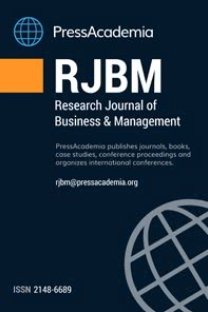THE EFFECT OF AN ETHICAL WORK CLIMATE ON ORGANIZATIONAL IDENTIFICATION AN EXAMPLE OF A LOGISTICS COMPANY
Purpose - This empirical study examines the relationship between an ethical work climate and organizational identification. Methodology - The survey was conducted across 122 employees, consisting of a sample from staff and managers of a leading logistic company in Turkey, which has branches in different cities such as İzmir, Mersin and İstanbul. The obtained data from the questionnaires were analyzed through the SPSS statistical package software. Findings- Analyses results revealed that two ethical work climate dimensions appear to have a positive impact on organizational identification.Conclusion- In today’s tough competitive environment achieving successful organizational outcomes are related to employee behavior and the factors that are affecting their attitudes towards the organization.
Keywords:
Organizational identification ethical work climate, quantitative research method, logistics sector,
___
- Ashforth, B. E.& Mael, F. (1989). Social identity theory and the organization. Academy of Management Review, 14(1), 20-39.
- Babin, B. J., Boles, J. S.& Robin, D. P. (2000). Representing the perceived ethical work climate among marketing employees. Journal of the Academy of Marketing Science, 28(3), 345-358.
- Cullen, J. B., Parboteeah, K. P.& Victor, B. (2003). The effects of ethical climates on organizational commitment: A two-study analysis. Journal of Business Ethics. V. 46(2), 127-141.
- Cullen, J. B., Victor, B.& Bronson, J. W. (1993). The ethical climate questionnaire: An assessment of its development and validity. Psychological Reports 73(2), 667-674.
- Cullen, J. B., Victor, B.& Stephens, C. (1989). An ethical weather report: Assessing the organization's ethical climate. Organizational Dynamics, 18(2), 50-62.
- DeConinck, J. B. (2011). The effects of ethical climate on organizational identification, supervisory trust, and turnover among salespeople. Journal of Business Research, 64(6), 617-624.
- Kelman, H. C. (1958). Compliance, identification, and internalization three processes of attitude change. Journal of conflict resolution, 2(1), 51-60.
- Kohlberg, L. (1981). The philosophy of moral development. San Francisco: Harper & Row.
- Mael, F. A.& Ashforth, B. E. (2001). Identification in work, war, sports, and religion: Contrasting the benefits and risks. Journal for the Theory of Social Behavior, 31(2), 197-222.
- Mael, F.& Ashforth, B. E. (1992). Alumni and their alma mater: A partial test of the reformulated model of organizational identification. Journal of organizational Behaviour, 13(2), 103-123.
- Martin, K.& Cullen, J. (2006). Continuities and extensions of ethical climate theory: A meta-analytic review. Journal of Business Ethics, 69, 175-194.
- Öncer, A. Z.& Yıldız, M. L. (2012). The impact of ethical climate on relationship between corporate reputation and organizational identification. Procedia-Social and Behavioral Sciences, 58, 714-723.
- Ruppel, C. P.& Harrington, S. J. (2000). The relationship of communication, ethical work climate, and trust to commitment and innovation. Journal of Business Ethics, 25(4), 313-328.
- Schneider, B. (1983). Interactional psychology and organizational behaviour. Research in organizational behavior. 5, 1-31.
- Schneider, B.& Rentsch, J. (1988). Managing climates and cultures: A futures perspective.
- Schwepker, C. H. (2001). Ethical climate's relationship to job satisfaction, organizational commitment, and turnover intention in the salesforce.” Journal of business research, 54(1), 39-52.
- Sims, R. L.& Keon, T. L. (1997). Ethical work climate as a factor in the development of person-organization fit.” Journal of Business Ethics, 16(11), 1095-1105.
- Tajfel, H. E. (1978). Differentiation between social groups: Studies in the social psychology of intergroup relations. Academic Press.
- Tsai, M. T.& Huang, C. C. (2008). The relationship among ethical climate types, facets of job satisfaction, and the three components of organizational commitment: A study of nurses in Taiwan. Journal of Business Ethics, 80(3), 565-581.
- Van Dick, R.& Wagner, U. (2002). Social identification among school teachers: Dimensions, foci, and correlates. European Journal of Work and Organizational Psychology, 11(2), 129-149.
- Van Dick, R., Wagner, U., Stellmacher, J.& Christ, O. (2004). The utility of a broader conceptualization of organizational identification: Which aspects really matter?. Journal of Occupational and Organizational Psychology, 77(2), 171-191.
- Victor, B.& Cullen, J. B. (1987). A theory and measure of ethical climate in organizations. Research in corporate social performance and policy, 9(, 51-71.
- Victor, B.& Cullen, J. B. (1988). The organizational bases of ethical work climates. Administrative Science Quarterly, 101-125.
- Yayın Aralığı: Yılda 4 Sayı
- Başlangıç: 2014
- Yayıncı: PressAcademia
Sayıdaki Diğer Makaleler
Pinar ACAR, Mujdelen İ. YENER, Asli TAYAN
Hewa Kumbalgoda Gamage Sriyani RANASİNGHE, Mohd Shukri Abd. YAJİD, Ali KHATİBİ
